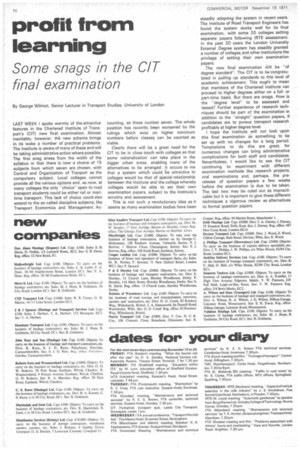profit from learning
Page 68

If you've noticed an error in this article please click here to report it so we can fix it.
Some snags in the CIT final examination
By George Wilmot, Senior Lecturer in Transport Studies, University of London LAST WEEK I spoke warmly of the attractive features in the Chartered Institute of Transport's (CIT) new final examination. Almost inevitably, however, the new scheme brings in its wake a number of practical problems. The Institute is aware of many of these and will be taking administrative action where possible. The first snag arises from the width of the syllabus in that there is now a choice of 15 subjects front which seven are chosen, with Control and Organization of Tranport as the compulsory subject. Local colleges cannot provide all the various options and, as now, at many colleges the only "choice" open to road transport students could be either rail or maritime transport. This lack of choice could also extend to the so-called discipline subjects, like Transport Economics and Management Ac counting, as these number seven. The whole position has recently. been worsened by the rulings which exist on higher minimum numbers before classes can be counted as viable.
Clearly there will be a great need for the CIT to be in close touch with colleges so that some rationalization can take place in the bigger urban areas, enabling many of the alternatives to be arranged. It occurs to me that a system which could be attractive to colleges would be that of special relationship between the Institute and the college whereby colleges would be able to set their own examination papers, subject to the Institute's scrutiny and assessment.
This is not such a revolutionary idea as it seems as many examination bodies have been steadily adopting the system in recent years. The Institute of Road Transport Engineers has found the system works well for its final examination, with some 20 colleges setting separate papers following IRTE assessment. In the past 20 years the London University External Degree system has steadily granted a number of colleges and other institutions the privilege of setting their own examination papers.
The new final examination Will be -of degree standard". The CIT is to be congratulated in pulling up standards to this level of academic achievement. This ought to mean that members of the Chartered Institute can proceed to higher degrees either on a fullor part-time basis. But there are snags. How is the "degree levelto be assessed and tested? Further experience of research techniques should be part of the examination in addition to the "straightquestion papers, if candidates are to pursue transport research profitably at higher degree level.
I hope the Institute will not look upon this final examination as something to be set up with no changes for a long period. Temptations to do this are great, for numerous changes can bring administrative complications for both staff and candidates. Nevertheless, I would like to see the CIT continuing to experiment with different examination methods like research projects, oral examinations and, perhaps, the prerelease of question papers a few weeks before the examination is due to be taken. The last two may be ruled out as impracticable but it is important to give these different techniques a vigorous review as alternatives to formal question papers.




















































































































